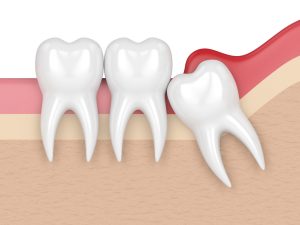Dental Clinic | Ang Mo Kio, Bedok, Jurong East, Tampines – Dental Implants & Oral Care Singapore
Complications involved with a wisdom tooth extraction
Complications involved with a wisdom tooth extraction

Although wisdom tooth extraction is a common procedure, there can be a risk of complications associated with the procedure. Complications can include swelling, bleeding, or numbness in the jaw. As such, it will be good to understand what can potentially happen after the extraction. The good news is that you can prevent or reduce most of these complications by following your dentist’s instructions and notifying your dentist if you notice these issues.
- Dry socket (Alveolar osteitis)
After the wisdom tooth removal, blood clots will form over the extraction site to help them heal. Alveolar osteitis or dry socket occurs if this blood clot is dislodged, leaving the nerve under your gum exposed to air or food debris. Patients who smoked were more likely to experience dry socket than those who do not smoke. A dry socket can happen 3 to 5 days following a wisdom tooth removal, and signs include throbbing or sharp pain. You will need to contact your dentist or oral surgeon if you start to feel this sharp or throbbing pain so that they can proceed to clean and cover the exposed extraction site.
- Pain and swelling
Pain and swelling are to be expected after any tooth extraction, especially within the first one to three days following the wisdom tooth removal. Your surgeon or dentist may recommend over the counter or prescription pain medication. If you are still experiencing moderate to severe pain, make sure you visit your dentist for a further examination.
- Limited mouth opening
With a lengthy procedure like tooth extraction, you can experience temporary trismus, or restriction opening your mouth. If jaw stiffness is prolonged, your dentist can recommend treatment such as heat therapy, pain medications, or muscle relaxants.
- Excessive bleeding
As it takes time for a blood clot to form over the extraction site, bleeding within the first 8-12 hours after extraction is normal. Avoid smoking and rinsing your mouth with saltwater to minimize bleeding.
- Lip numbness
Your wisdom teeth are located near the inferior alveolar nerve in the jaw. If the nerve becomes damaged during the procedure, it can lead to numbness in the lips or jaw. This numbness is usually temporary, but it can be permanent if nerve damage is severe. However, lip numbness is very rare.
Your dentist or surgeon will have informed you on the possible wisdom teeth extraction complications and their recommendations for aftercare to reduce the risk. If you are still concerned about a side effect or complication of your wisdom teeth removal or want to find out more about wisdom tooth extraction, feel free to contact us at 1728 Dental to book a consultation:
1728 Dental@AMK: +65 9631 1728
1728 Dental @Bedok Central: +65 8764 1728
1728 Dental@Jurong East: +65 9770 1728
1728 Dental@Tampines: +65 9725 1728
Alternatively, you may WhatsApp us at:
















